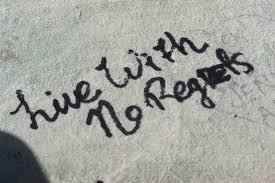
How to Be Informed By Your Regrets Before 40 by Mark Anthony Dyson
Not all career decisions are amusing stories we can tell later, even if things turned out OK. We often lack foresight and insight when we’re in our early 20s. Sometimes our “yes” should have been “no”—and vice versa.
Setting career strategies and goals takes work. Yes, we want to take control of our careers by accepting full responsibility for our actions, creating opportunities for ourselves, and staying connected. There are those times when we put lots of food on our plates, but we will only eat some and often waste the food.
Some decisions seemed horrible then, but it was the right call. You may only appreciate those later, like when you’re over 40. I thought of a few, and perhaps you can spot them sooner than I did:
1. You said “no” and missed out
When you’re young, you value moving up the ladder and want life experiences with friends. You want both, but saying “no” to career opportunities (or a single one) leaves you with feelings of unrequited love. On the trip back to reality, your values mean more than status, and contentment means more than confinement in a career.
It’s bittersweet, but those relationships you built through your experiences were too valuable. Now you understand these relationships start the process way before any crisis.
Only after a few interactions, your resume will take a relevant shape.
2. You were fired, and afterward, your career stalledHow does it feel when you realize being “fired” was either a great new beginning or a shareable life lesson? Being “let go” was not judgment day, but it felt like it. It feels as if Satan, in the form of disappointment, is stalking you. It took years to get over the sting. The needles and pins of pain. The cloudy and stormy feelings of shame.
Some people need help in understanding why it happened, but others discover freedom and relief quickly is what was supposed to happen. You lost a job for reasons not uncommon to man. If you haven’t reframed it positively, now is the time to do so for the rest of your career.
3. You chose life over money.
Our parents told us to have fun and work hard in our 20s. Some of us were underemployed but refused to go home because we loved our freedom. We ate Spam or Ramen noodles to survive because we decided to immerse ourselves in our lives. The sting remained for years, but we can go to that place when challenges cloud our vision.
Sometimes we gain wisdom from there; other times, clarity or novocaine. You can see the ending to your story clearer, so now you save. Even better, happiness used to have a different cash value. Your ability to career management brings a smile and not a competitive smirk.
4. You lost track of tech and professional relationships.
Certain technologies can become old-school in a short time. Your career path can become irrelevant quickly if you are not on top of trends in your industry. Your friends indirectly challenged you to keep up because they were moving, and you knew you had to keep up.
Somewhere along the way, relationships changed, priorities rearranged, and we feel we should start over again. Tech is infused with life now, so you have to catch up. It will take a little while if you work on it daily.
5. You couldn’t accept “no” from a potential employer.
Rejection makes us more robust, and boy, is it painful at the time.
Sometimes it turned out great, and then you’re grateful for the “trial.”
Remember those who benefited from your path and how it turned out because they are not better without you. Whether you just started a new job yesterday or 20 years ago, you can list 20 ways you’re valuable to your next employer. And do yourself a favor: Keep adding to the list.
6. The lousy boss had value, after all.
We may not like the messenger, but the message was on point. Sometimes our jagged little life-saving pill was brought by an ugly carrier pigeon, and we reject the message for the wrong reasons. In our late 30s or early 40s, we realize when a more acceptable package our ugly acting boss was right. We hated the message and the messenger.
Don’t worry, most of us have been there, but it would have saved us or someone else much heartache if we had looked much deeper at the message. The diamond isn’t in the delivery but in the package.
We get to where we realize what’s most useful and valuable lessons are only sometimes recognizable at first. We may have reached a more straightforward space before 40. But the one thing we do know is upon arrival. We appreciate our career journey more because clarity is an irreplaceable part of our experience.
About Mark Anthony Dyson
I am the "The Voice of Job Seekers!" I offer compassionate career and job search advice as I hack and re-imagine the job search process. You need to be "the prescription to an employer's job description." You must be solution-oriented and work in positions in companies where you are the remedy. Your job search must be a lifestyle, and your career must be in front of you constantly. You can no longer shed your aspirations at the change seasons. There are strengths you have that need constant use and development. Be sure you sign up to download my E-Book, "421 Modern Job Search Tips 2021!" You can find my career advice and work in media outlets such as Forbes, Inc., Fast Company, Harvard Business Review, Glassdoor, and many other outlets.